Overview
Angel investors and venture capitalists play essential roles in nurturing startups, each offering unique forms of support.
- Angel investors typically provide smaller amounts of funding, along with a more flexible and personal touch during the crucial early stages of a business. This personal involvement often creates a warm and nurturing environment that can significantly benefit startups, as many of our members have experienced.
- In contrast, venture capitalists tend to focus on larger investments aimed at scaling established businesses, which can sometimes lead to a more structured and performance-driven approach. While this can be beneficial, it may also impose considerable pressure on new ventures.
We understand that navigating these funding landscapes can be challenging, and it's important for entrepreneurs to feel supported and valued as they pursue their dreams.
Introduction
In the dynamic world of startup funding, we understand that navigating financial journeys can be daunting for entrepreneurs. The roles of angel investors and venture capitalists are crucial to grasp, as they each bring unique support to the table.
- Angel investors, often high-net-worth individuals, not only provide essential early-stage capital but also offer invaluable mentorship that can guide you through the initial hurdles.
- On the other hand, venture capitalists operate through firms that manage pooled investments, focusing on larger, later-stage funding, which can feel overwhelming at times.
As the landscape evolves, especially with the rise of tech trends and a growing interest in diverse founders, both funding sources present unique advantages and challenges that can significantly impact your journey. This article aims to explore the key differences between these two types of investors, the pros and cons of each funding option, and the critical factors that startups should consider when seeking financial support.
Through insights from industry experts and successful case studies, we hope to illuminate how choosing the right path can shape your startup's trajectory toward success, fostering a community of support and shared experiences.
Name: Defining Angel Investors and Venture Capitalists
Angel backers are often high-net-worth individuals who provide essential capital to startups in exchange for equity, particularly during the critical early stages of a company's development. These financiers not only contribute their own funds but also frequently offer mentorship and valuable industry connections, which can be pivotal for fledgling companies. We understand that navigating these early stages can be daunting, and having supportive backers can make all the difference. In contrast, venture capitalists (VCs) operate as part of firms that manage pooled funds from various backers, focusing on later-stage financing that requires larger capital commitments.
VCs typically seek significant equity stakes, often ranging from 20% to 50%, and expect structured governance and rapid growth in return for their investment. This can create pressure for startups, which is why having angel investors who are more adaptable and willing to take risks on early-stage ventures can be such a blessing. Recent insights from industry specialists emphasize that while both angel investors and venture capitalists play vital roles in funding new businesses, their methods and expectations differ greatly. For instance, private backers tend to be more flexible, whereas VCs often require a more structured approach and a clear path to profitability.
Successful stories of early-stage financiers in the tech sector illustrate the profound impact these individuals can have on business growth. At fff.club, we have cultivated a vibrant community that connects tech leaders from companies like Bolt and Wise, fostering co-investing opportunities that enhance the funding landscape. Notably, Kristjan Vilosius, a prominent figure in Estonia's tech scene, exemplifies the balance between startup success and investment. His involvement in firms like Katana MRP, which recently secured a €35 million funding round, showcases how backers can leverage their expertise and connections to assist developing enterprises.
In its first year, fff.vc grew to over 200 members, worked through 659 early-stage deals, and invested approximately €4 million in 7 deals, providing access to opportunities like Votemo, Insly, DriveX, Scramble, RecruitLab, Bolt, and KatanaMRP. This growth underscores the organization's establishment as a key player in the Baltics region for early-stage funding. Furthermore, the funding guide developed by fff.vc serves as a valuable resource for stakeholders, offering insights and strategies for managing early-stage funding opportunities.
As we look ahead to 2024, the startup landscape has become increasingly diverse, with founders from various backgrounds attracting both angel investors and venture capitalists. This shift is reflected in the significant funding trends, where AI companies received a record $73 billion in mega deals, surpassing non-AI companies for the first time. This trend suggests a potential rebound in the tech funding landscape, reminiscent of the rise of mobile technology following the global financial crisis.
The growing interest in investment firms is also evident, as seen in Benchmark Capital's monthly web traffic of 17,000, highlighting the increasing engagement in the funding ecosystem. Specialist perspectives emphasize the evolving role of early-stage financiers in the entrepreneurial landscape. As Fredrik Dahlqvist, a senior partner at a leading venture firm, notes, 'We are seeing portfolio companies investing more in exit preparation, given the need to achieve attractive returns in an environment with increased buyside scrutiny on valuations and elevated interest rates.' This underscores the essential role that financial backers play in preparing new ventures for successful exits, further reinforcing their significance in the funding environment.
In conclusion, understanding the key traits and distinctions in the context of angel investors versus venture capital is crucial for new businesses seeking financial support. While both offer invaluable resources, their distinct approaches can significantly influence a new venture's trajectory. We encourage entrepreneurs to engage with both types of investors, fostering a supportive community that can nurture their growth and success.
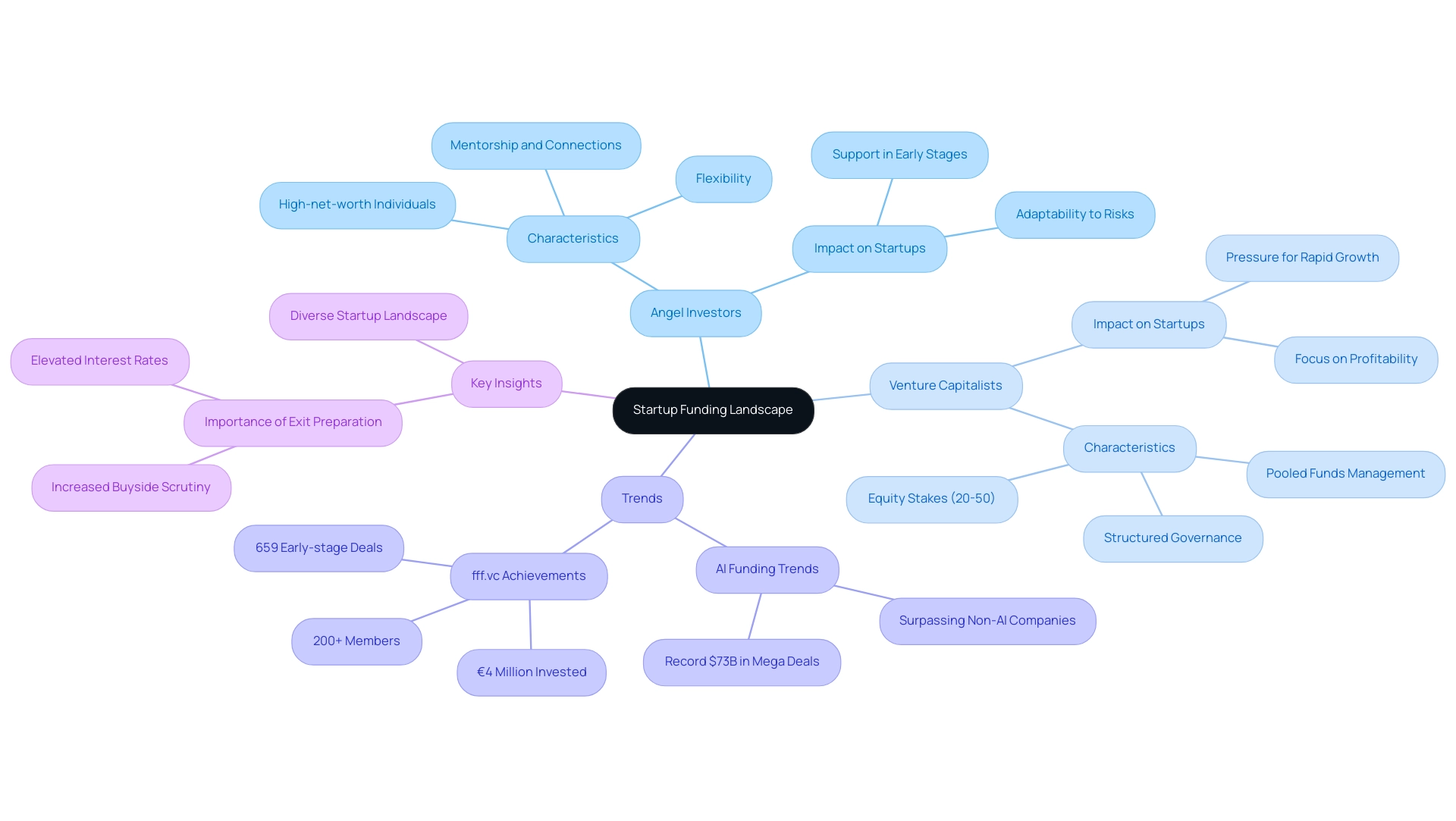
Key Differences Between Angel Investors and Venture Capitalists
The differences between angel investors and venture capital are significant, particularly when it comes to funding amounts, decision-making processes, and levels of engagement. Understanding these distinctions is crucial for entrepreneurs navigating their funding journey.
- Angel investors typically contribute smaller sums, ranging from $10,000 to $100,000, which can be ideal for early-stage startups seeking initial funding.
- In contrast, venture capitalists (VCs) often invest millions, targeting companies with substantial growth potential in innovative technologies.
For example, Lightspeed Venture Partners, with a portfolio of over 800 organizations, showcases the capacity for larger investments that distinguish VCs from angel investors.
The decision-making processes also differ markedly between the two.
- Angel backers often make quicker, less formal decisions based on personal judgment and experience, frequently drawn to mission-driven founders and sectors where they possess firsthand knowledge.
- This agility allows them to support startups that resonate with their values and vision.
Conversely, VCs engage in a more structured decision-making process that involves multiple stakeholders, ensuring thorough due diligence before committing significant capital. This can feel overwhelming for entrepreneurs, but it reflects a commitment to responsible investment.
In terms of involvement, early-stage financiers often take a hands-on approach, providing mentorship and guidance to entrepreneurs.
- This nurturing support contrasts with VCs, who typically focus on scaling businesses and may adopt a more hands-off governance style.
- For instance, SOSV, a deep tech venture firm, exemplifies how VCs can offer technical expertise and supportive programs to help founders navigate complex challenges in industries like biotech and climate tech, enhancing their funding strategies.
For entrepreneurs seeking financial support, recognizing the distinctions between angel investors and venture capital is essential.
- Those looking for early-stage funding and a collaborative partnership may find angel investors more suitable, while emerging companies with significant financial needs and rapid growth potential might benefit from the resources and networks that venture capital provides.
As Akim Arhipov, founder of Finance, Freedom, Fellows, wisely states, 'Financial superpowers should be accessible to everyone,' highlighting the inclusive nature of startup investing.
The community and funding opportunities at fff. Club empower technology financiers by promoting collaboration and exchanging insights. Many members, like Kristjan Vilosius, balance entrepreneurial success with venture funding in Estonia's tech landscape.
As we look toward the evolving landscape in 2025, these insights into the funding strategies and decision-making processes of early-stage backers and venture capital firms remain vital for making informed financing choices. Together, we can navigate these challenges and foster a supportive community.
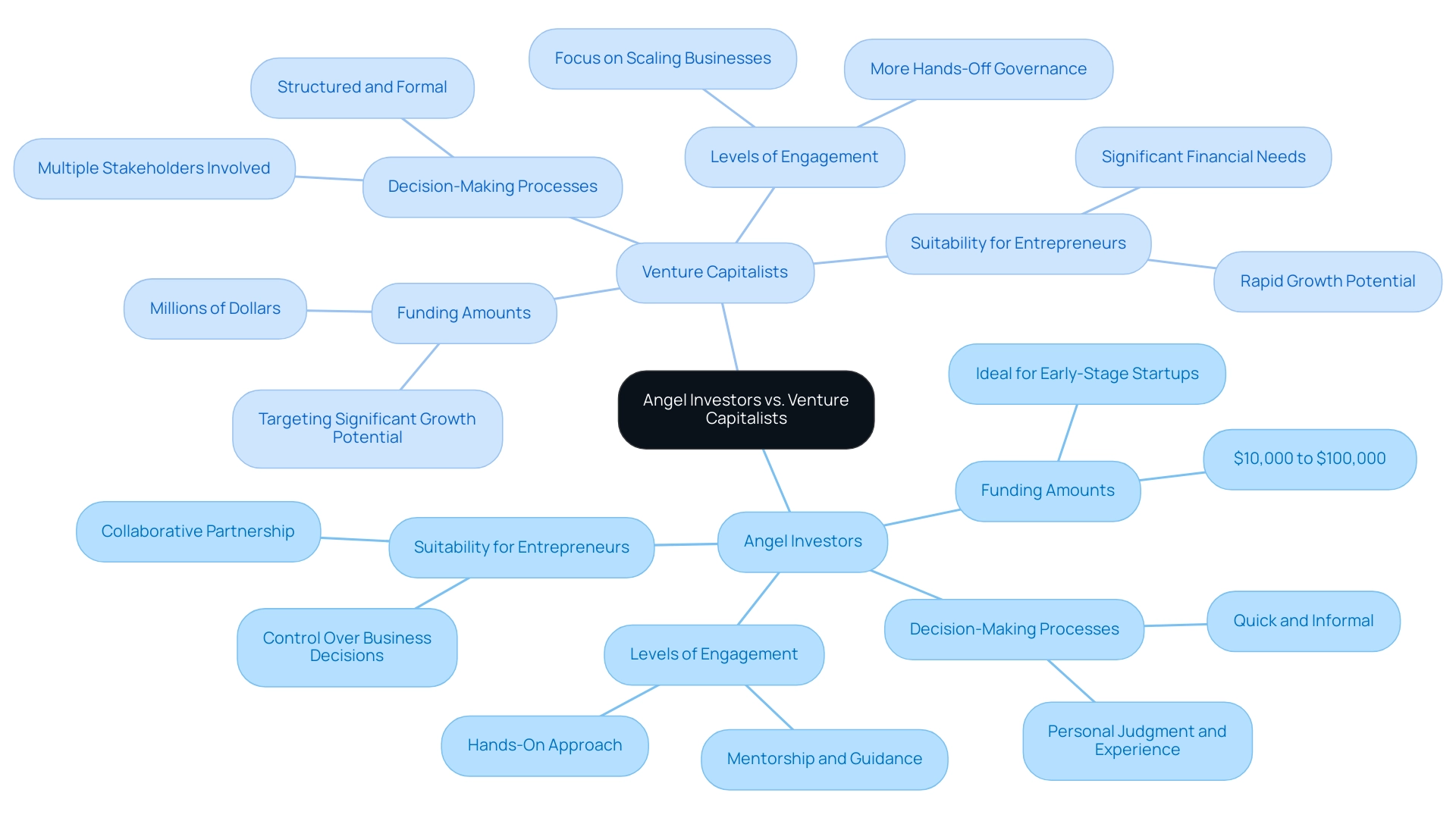
Pros and Cons of Angel Investing and Venture Capital
Angel investing presents a range of advantages that can significantly support new businesses, particularly in Estonia's vibrant tech landscape. One key benefit is the speed of decision-making; private backers often operate with less bureaucracy, allowing for quicker funding processes. Notably, individuals like Kristjan Vilosius illustrate how angel investors can harmonize startup success with personal commitments, highlighting the potential for mentorship and guidance that springs from their varied experiences.
Vilosius has developed a systematic approach to his financial career, enhancing his efficiency in this role. Yet, it’s important to recognize the challenges that come with angel investing. Typically, angel investors have a more limited funding capacity compared to venture capitalists, which may constrain the scale of investment.
Additionally, the support structures offered by angel investors can be less formalized, potentially leaving new businesses without the extensive resources that larger firms might provide.
On the other hand, venture capital offers substantial funding, which can be crucial for new businesses aiming for swift growth. This funding often opens doors to a broad network of resources, including industry connections and strategic advice. However, the expectations tied to venture capital can be overwhelming; new businesses may encounter pressure for aggressive growth and performance metrics, resulting in equity dilution as they surrender a larger share of their enterprise.
The decision-making process in venture capital is also more intricate, frequently involving multiple stakeholders and prolonged negotiations.
When evaluating funding options, it’s essential for new businesses to consider these factors thoughtfully. Recent statistics reveal that startups supported by private backers boast a success rate comparable to those backed by venture capitalists, especially in their early stages. By 2025, equity contributions will represent a significant portion of the funding ecosystem, underscoring their relevance in today’s landscape.
For example, under the Enterprise Investment Scheme (EIS), private investors are limited to a maximum 30% share in a business, enabling entrepreneurs to maintain control while still reaping the benefits of external funding.
Moreover, case studies underscore the effectiveness of angel funding in nurturing innovation. Successful angel-backed startups have shown remarkable resilience and adaptability, often surpassing their venture-capital-backed counterparts in certain sectors. Insights from the case study titled "Limited Partners: Distribution Growth Offsetting Muted Returns" indicate that while private equity grapples with declining returns, the favorable cash flow situation for limited partners suggests a shift toward liquidity, which may shape funding strategies.
As Akim Arhipov, founder of fff.club, aptly states, "Financial superpowers should be accessible to everyone," highlighting the community-driven approach that can empower entrepreneurs. With over 400 tech investors engaged in collaborative wealth management, the fff.club exemplifies how community involvement can enhance the financial landscape.
Testimonials from members reinforce the effectiveness of the collaborative evaluation process, emphasizing the advantages of community-driven investment decisions. As the funding landscape evolves, grasping the nuances between angel investors and venture capital becomes increasingly vital for entrepreneurs striving to make informed choices about their financial futures.
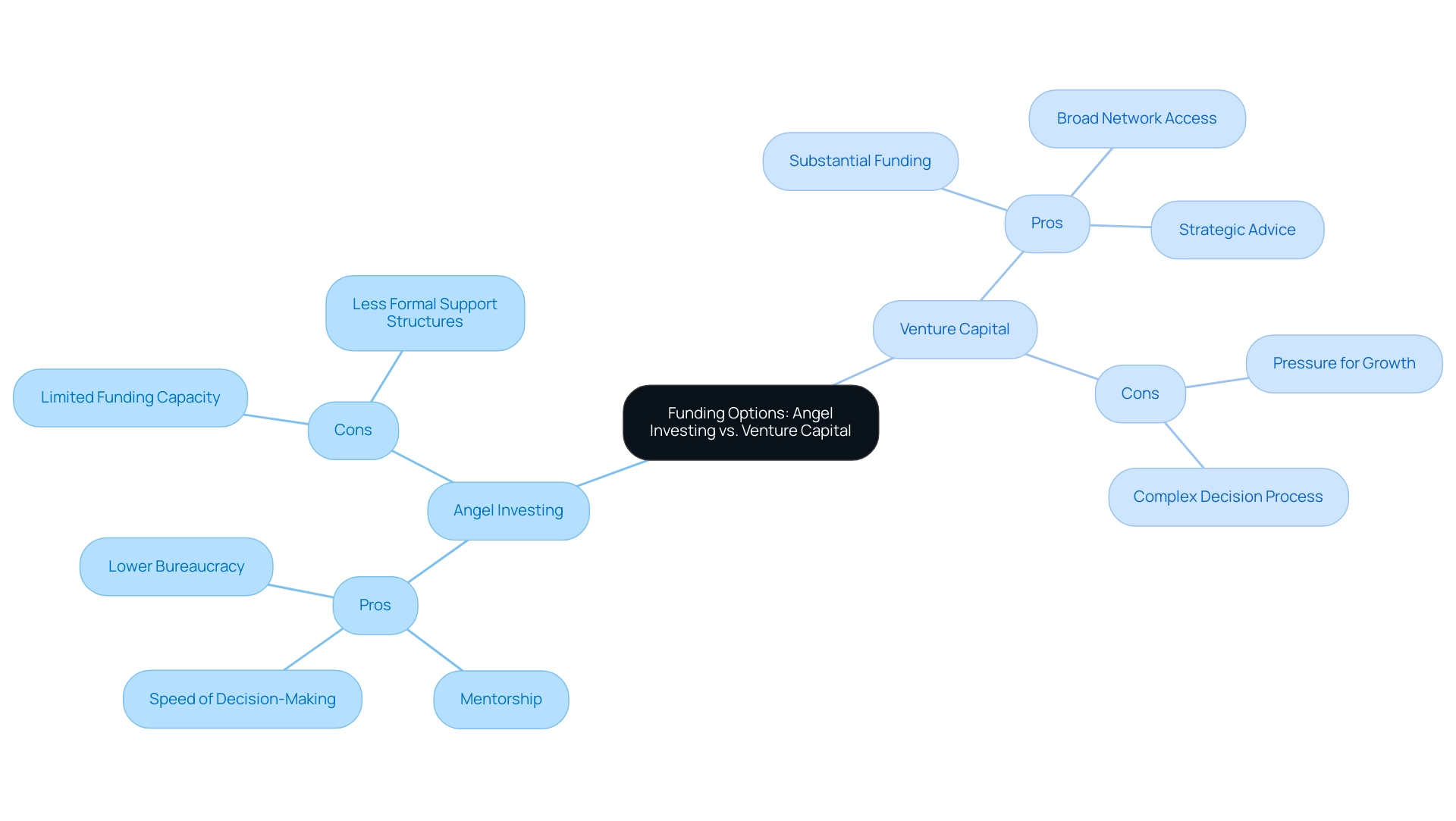
What Investors Look For: Evaluation Criteria
Angel backers often seek out new ventures that not only showcase a compelling business concept but also feature a strong founding team and signs of early traction in the market. They place significant value on personal connections, frequently opting to invest in sectors that resonate with their passions. In contrast, the approach of angel investors compared to venture capitalists emphasizes scalability, market potential, and detailed financial projections.
These investors are particularly drawn to new ventures that demonstrate a clear trajectory toward profitability and substantial growth potential.
As we look ahead to 2025, the assessment standards for early-stage funders have evolved to emphasize diversity and inclusivity within the entrepreneurial ecosystem. For instance, recent statistics reveal that 6.36% of female-led firms received funding from angel networks, compared to 3.4% of male-led firms. This highlights a growing recognition of the importance of diverse leadership in investment decisions.
Expert insights underscore the necessity for new ventures to customize their presentations based on the specific interests of prospective funders. Tersha Willis, founder of Terrible* and winner of The Pitch 2020, shares a valuable perspective: "There will be lots of things that attract various backers’ interests and things that they’re inspired by, so you have to tailor your pitch to the individuals you’re talking to."
When evaluating startups, early-stage financiers often employ a set of assessment standards that includes the startup's market fit, the distinctiveness of the business model, and the potential for return. Case studies illustrate that successful backer contributions frequently arise from a collaborative method, as seen in fff.club, where over 400 tech supporters engage in due diligence and co-funding opportunities. This community-driven model not only enhances their understanding of the market landscape but also fosters valuable connections.
Additionally, fellows at fff.club benefit from weekly tech and economic updates and can participate in various events that further enrich their investment insights. Tony E. Kula emphasizes the importance of building a diverse portfolio and joining angel syndicates, which can provide additional support and resources for investors. This collaborative environment aids in informed decision-making while fostering community engagement, as highlighted by Karina Kundzina, who promotes updates for entrepreneurial resources.
In the ongoing discussion of angel investors versus venture capital, venture capitalists specifically seek new businesses that possess not only innovative ideas but also a scalable business model capable of attracting significant market share. They evaluate the company's competitive edge and the team's ability to implement the business plan effectively. By understanding these distinct yet overlapping criteria, startups can better position themselves to attract the right type of funding, ultimately leading to more informed funding choices.
Insights from Baltic leaders in finance, such as Donatas Keras and Kristjan Tamla, further illustrate the role of community in shaping early-stage and Climate Tech funding, showcasing how collaborative strategies can drive success in the tech funding landscape.
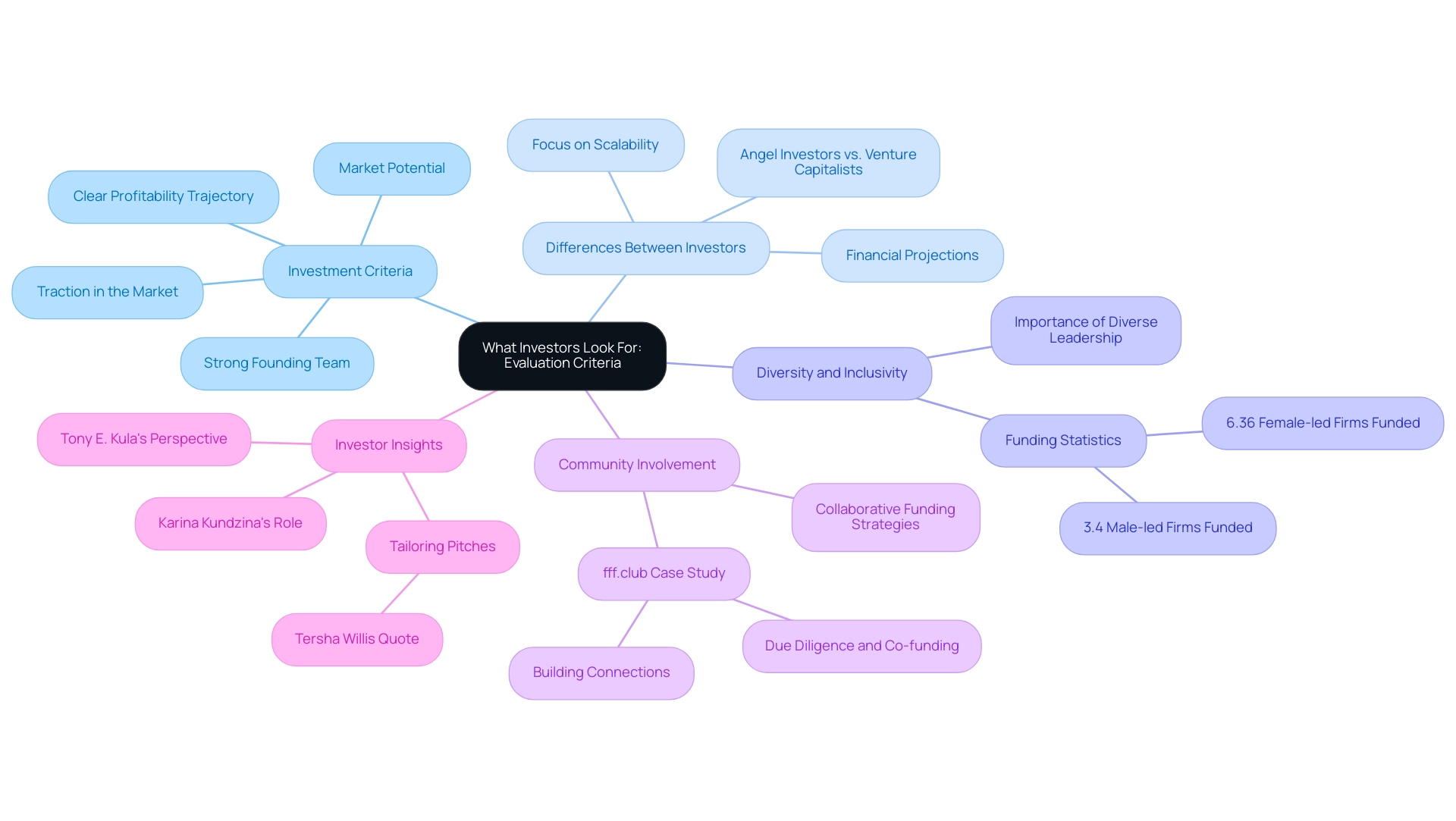
When to Choose Angel Investment vs. Venture Capital
Startups in their early stages, especially those still refining their product or establishing market fit, often discover that angel investors can be a more supportive option compared to venture capital. This funding route not only provides financial assistance but also offers invaluable mentorship and guidance from experienced backers—a key benefit highlighted by the caring community at Finance, Freedom, Fellows (fff.club). When weighing the choice between angel investors and venture capital, it’s clear that angel investors typically invest smaller amounts, which allows for greater flexibility in funding structures and expectations.
Conversely, businesses that have already demonstrated traction and are ready for rapid scaling may find significant advantages in venture capital. This funding source is characterized by larger capital sums, essential for driving substantial growth and expanding market reach. In 2024, the tech landscape witnessed a remarkable shift, with AI companies attracting $73 billion in mega deals, far surpassing the $47 billion received by non-AI companies.
This trend highlights the importance of aligning funding strategies with market dynamics and growth potential.
The decision to seek funding from private investors or venture capital is influenced by various factors, including the company’s stage of development, financial needs, and long-term objectives. For early-stage companies, prioritizing angel investors can leverage the mentorship and networks of experienced investors available through fff.club. In contrast, those prepared to scale might opt for venture capital to secure the necessary resources for aggressive growth.
Expert opinions in 2025 suggest that new ventures should thoughtfully evaluate their current position and future aspirations when deciding between these funding options. As Taavi Roivas, former Prime Minister of Estonia, wisely noted, "Understanding the landscape of funding options is crucial for new businesses aiming to navigate their growth effectively." Numerous successful case studies illustrate that many new businesses have thrived by choosing private funding during their early phases, enabling them to establish a strong foundation before pursuing larger venture capital rounds.
The narratives of Sten Tamkivi and Kristjan Vilosius exemplify how a community-focused approach can enhance funding strategies and decision-making for new ventures, offering access to exclusive deal flows and valuable insights from over 400 tech investors.
Furthermore, the emphasis of SOSV on deep tech investments reflects current trends in funding, suggesting that new businesses in fields such as biotech, hardware, and climate tech may particularly benefit from individual investment compared to venture capital. Ultimately, understanding the nuances between angel investors and venture capital can significantly influence a new venture’s trajectory and success in the competitive tech landscape.
To explore these opportunities further, we warmly invite you to book a call and learn how you can connect with over 400 tech fellows at fff.club.
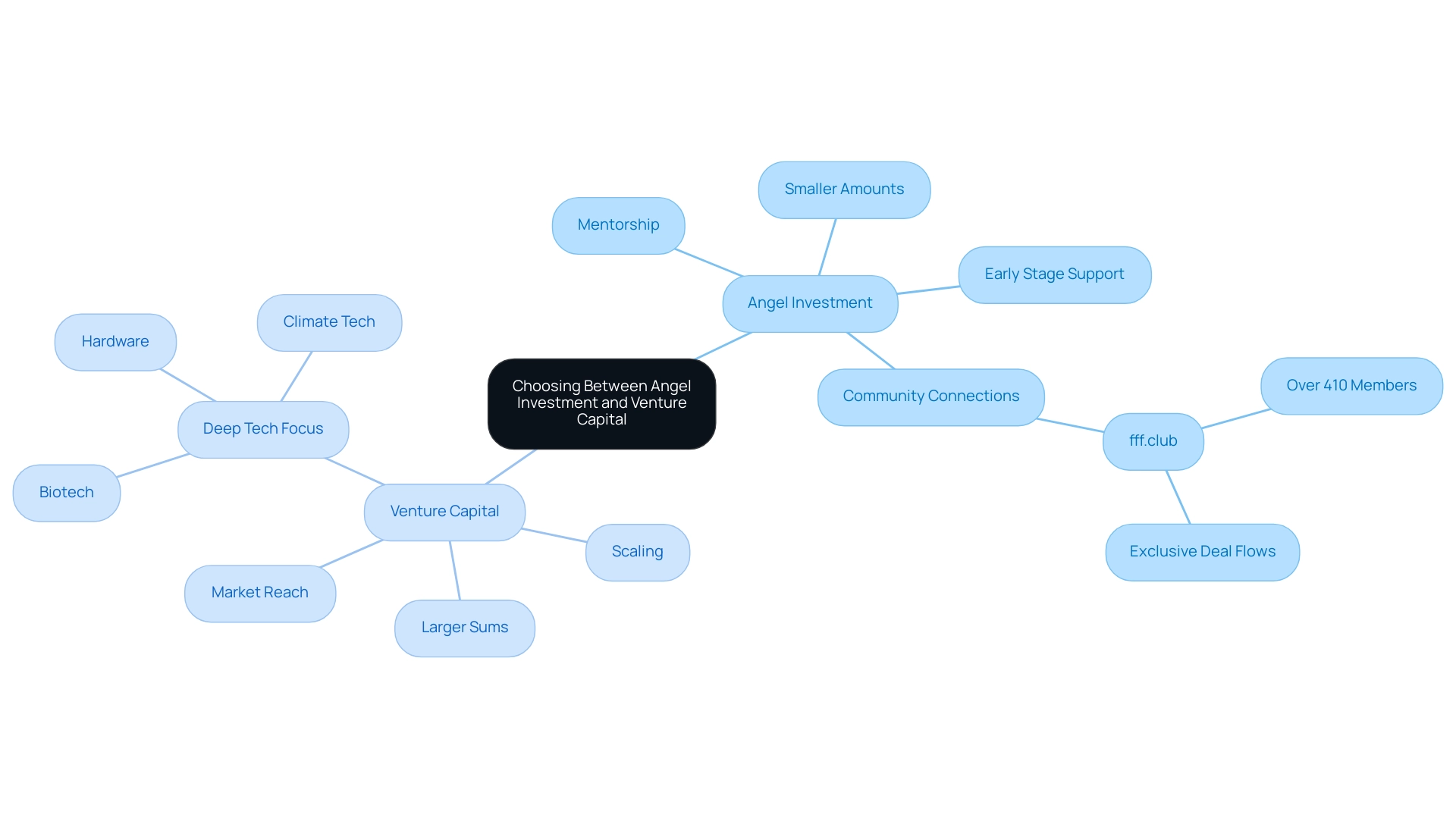
The Role of Mentorship in Angel Investing
Mentorship plays a pivotal role in early-stage investing, shedding light on the distinctions between angel investors and venture capital funding. Many angel investors actively engage with the ventures they support, offering not just financial backing but also strategic guidance, industry insights, and valuable networking opportunities. This hands-on involvement is particularly crucial for early-stage companies, as it helps them navigate challenges and make informed decisions that can significantly impact their growth trajectory.
In 2025, statistics reveal that new ventures benefiting from mentorship programs see a graduation rate of 74–77%, compared to only 55.9% for the general STEM student population. This emphasizes the profound effect mentorship can have on early-stage company performance and achievement, indicating that similar dynamics may pertain to the business environment where mentorship directly affects growth and sustainability.
Insights from Baltic financial leaders like Sten Tamkivi and Kristjan Vilosius underscore the importance of community in nurturing successful funding. Tamkivi, with his extensive experience in technology and finance, emphasizes the need for a supportive network that empowers entrepreneurs. At the same time, Vilosius demonstrates how balancing new business success with private funding can create a flourishing ecosystem, where guidance and community involvement are essential factors of innovation.
At Finance, Freedom, Fellows, individuals seeking to develop valuable connections can obtain funding insights, receive weekly technology and economic updates, and engage in events that promote community involvement. For those interested in deal flow, due diligence, and co-investing opportunities across venture capital, private credit, and real estate, the resources available at fff.club are invaluable.
Case studies indicate that capital providers are increasingly attracted to emerging companies that present compelling narratives, demonstrate market validation, and possess scalable business models. The expertise and adaptability of the founding team are also critical factors, as well as the potential for substantial returns through exit strategies like acquisitions or IPOs. Significantly, the case study titled 'What Investors Seek in 2025' highlights that new businesses concentrating on storytelling, evidence of traction, and clear exit strategies are more likely to draw investment from affluent backers, emphasizing the importance of mentorship in guiding entrepreneurs to present their ventures effectively.
While some angel investors and venture capitalists may offer mentorship, their primary focus often leans towards financial returns and governance, which can make the mentorship aspect less pronounced. This difference emphasizes the distinct worth that private backers contribute. They not only provide capital but also cultivate an environment where new ventures can thrive through guidance and support.
As Mihkel Torim, a prominent figure at LHV, observes, the dedication of early-stage funders to provide startups with essential insights and resources is crucial for informed decision-making, especially in assisting entrepreneurs in customizing their presentations to fit current trends and connect effectively with funding communities.
In summary, the role of mentorship in early-stage funding is not merely advantageous; it is a vital element that boosts startup success, particularly in the context of angel investors versus venture capital. By facilitating connections and offering strategic assistance, early-stage financiers significantly contribute to the growth and sustainability of the companies they back, distinguishing them from the more transactional nature often linked with venture capital.
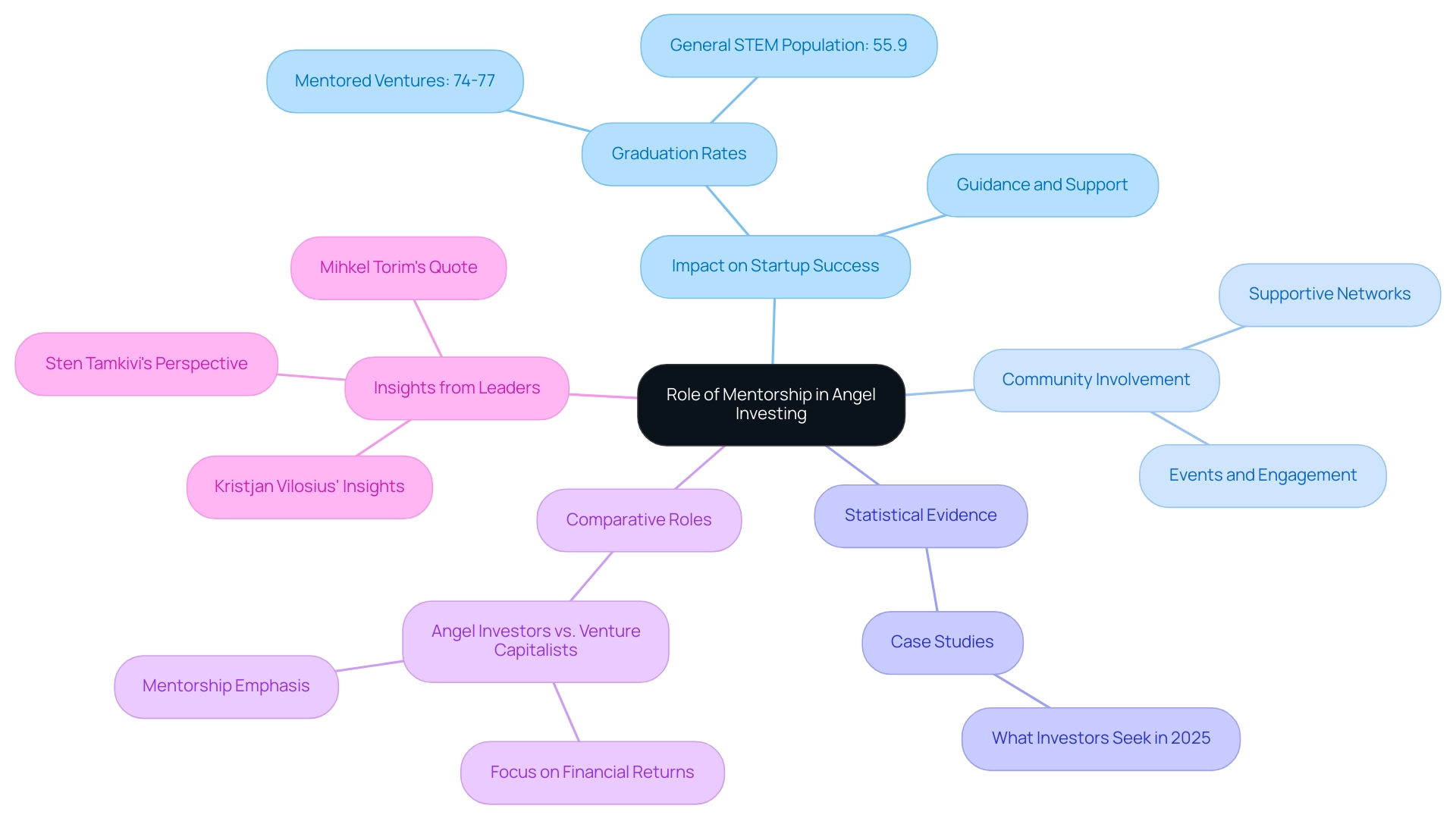
Understanding the Regulatory Environment for Funding Options
The regulatory environment for angel investors compared to venture capital presents notable differences that significantly impact funding strategies. We understand that navigating this landscape can be daunting. Angel backers typically operate within a less stringent regulatory framework, which offers them greater flexibility in their funding choices. However, they still have to adhere to local securities laws and investment regulations, which can vary widely by jurisdiction. This flexibility allows angel backers to engage more directly with startups, often fostering more personal relationships with the companies they support.
In contrast, the differences between angel investors and venture capitalists are underscored by their operation in a more complex regulatory environment. The pooled nature of their funds and the involvement of institutional participants lead to stricter compliance requirements. This means that venture capitalists must comply with rules established by regulatory authorities, aiming to safeguard stakeholders and ensure transparency in fund management. As a result, they are often required to conduct thorough due diligence and maintain rigorous reporting standards, which can sometimes slow down the investment process.
Recent trends indicate a growing emphasis on impact investing within both sectors, reflecting a shift in priorities towards sustainable and socially responsible ventures. This trend is accompanied by increasing collaboration among stakeholders, which can help mitigate risks associated with regulatory compliance. For instance, in 2024, private equity limited partners reported net positive cash flows for the first time since 2015. This indicates a potential shift in how funds are managed and distributed, despite an overall decline in industry-wide internal rates of return (IRR).
The case study titled "Limited Partners: Distribution Growth Offsetting Muted Returns" illustrates these trends, highlighting the challenges encountered by stakeholders in a changing landscape. As of 2025, the regulatory environment for private investing continues to evolve, with new statistics shedding light on compliance challenges. A significant percentage of angel backers report difficulties in navigating this regulatory landscape, which can hinder their ability to invest effectively. We recognize that understanding these regulations is vital for both startups seeking funding and individuals looking to make informed decisions.
Mihkel Tourism, an industry leader, emphasizes that Finance, Freedom, Fellows' commitment to equipping members with the necessary insights and resources is crucial for making informed decisions. Furthermore, the recent news about British Airways' parent company launching a £168 million technology venture capital arm underscores the dynamic nature of the venture capital landscape. By staying informed about regulatory changes, individuals can better position themselves to capitalize on emerging opportunities while minimizing potential risks.
Notably, influential impact investors like Triin Hertmann and Sten Tamkivi exemplify the potential of community engagement and educational resources in navigating this complex landscape, inspiring a new generation of tech investors. Additionally, the founders of Finance, Freedom, Fellows, Akim Arhipov and Tim Vaino, play a crucial role in fostering connections and providing insights into private market opportunities across venture capital, private credit, and real estate.
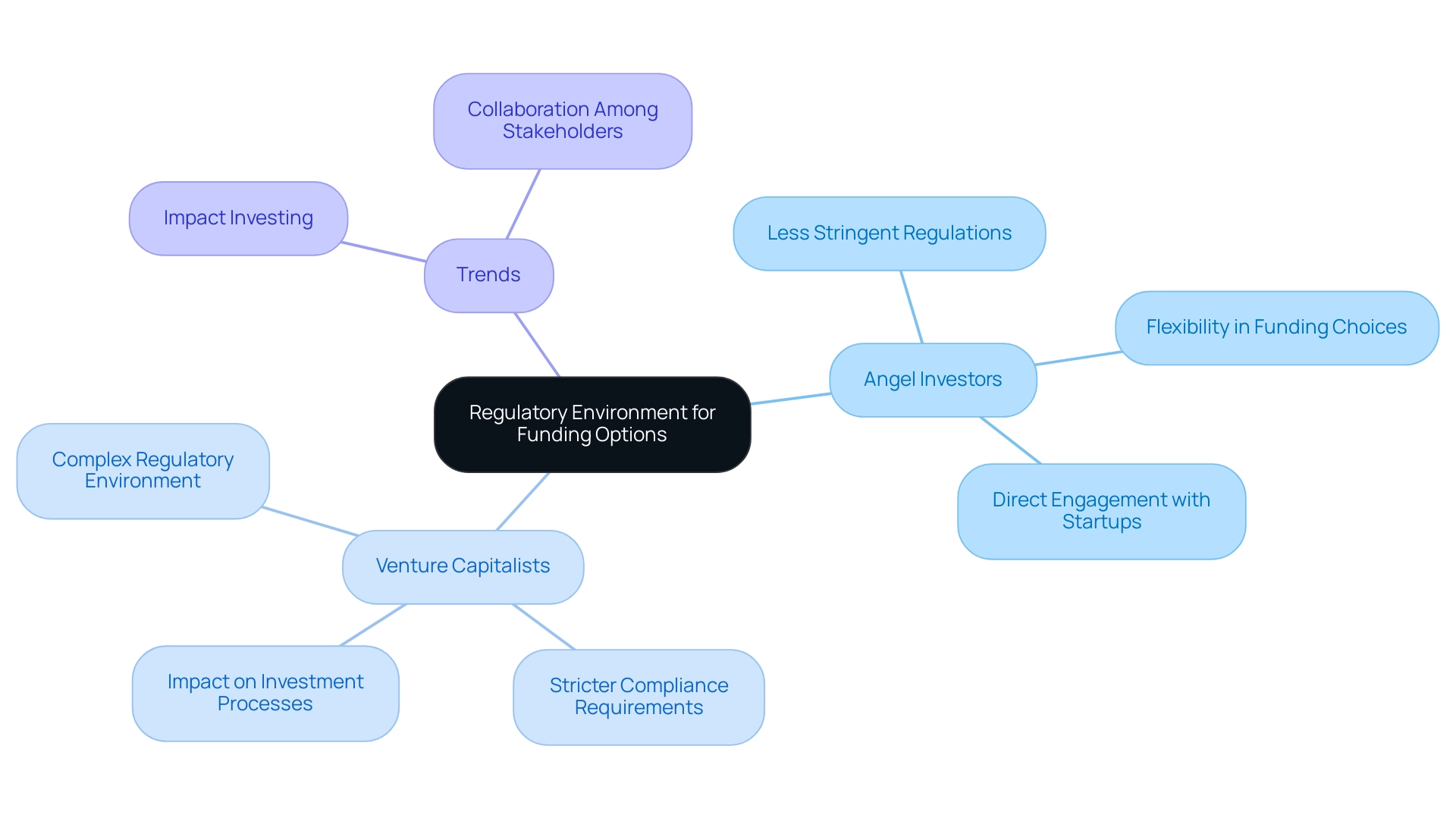
Conclusion
Understanding the distinctions between angel investors and venture capitalists is crucial for startups navigating the often overwhelming journey of securing the right funding for their growth. Many entrepreneurs, especially in their formative stages, find that angel investors not only provide early-stage capital but also offer invaluable mentorship and personal connections. This nurturing support can be the lifeline that helps startups flourish. On the other hand, venture capitalists step in with larger sums for companies ready to scale rapidly, yet they come with higher performance expectations and a more structured governance approach.
The advantages and disadvantages of each funding source highlight a significant challenge for startups: evaluating their specific needs and long-term goals. Angel investing can lead to quicker decision-making and the kind of personal guidance that many startups crave, while venture capital can unlock substantial resources and networks essential for scaling. As we’ve seen in our community, the evolving landscape of startup funding underscores the critical role of mentorship, especially in angel investing, where personal involvement can significantly influence a startup's success.
As the funding ecosystem continues to diversify, with a growing emphasis on inclusivity and innovation, we understand that entrepreneurs must stay informed about the regulatory environment and funding trends. By aligning their funding strategies with their developmental stage and market potential, startups can navigate their financial journeys more effectively. Ultimately, the choice between angel investment and venture capital can profoundly shape a startup’s trajectory. It’s essential for entrepreneurs to deeply understand and leverage the unique benefits each option offers, ensuring they feel supported and empowered every step of the way.



